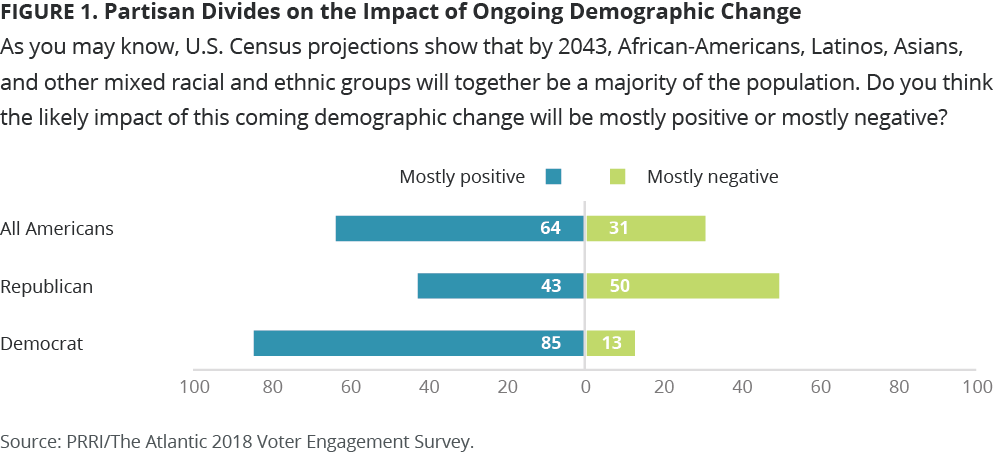A new poll from PRRI had some pretty interesting findings regarding evangelicals and racial change. Namely, white evangelicals are more likely than white Americans in any other religious group to view the browning of America as a bad thing. In a 2018 survey, pollsters put the following question to a national sample of Americans:
As you may know, U.S. Census projections show that by 2043, African-Americans, Latinos, Asians, and other mixed racial and ethnic groups will together be a majority of the population. Do you think the likely impact of this coming demographic change will be mostly positive or mostly negative?
The result was perhaps unsurprising: While 65% of Americans overall stated the coming demographic change would be mostly positive, there was a strong partisan divide, with 43% of Republicans and 85% of Democrats indicting that the change would have mostly positive results. Similarly, 31% of Americans indicated that the change would be mostly negative, a response that included a full 50% of Republicans and a mere 13% of Democrats.

It’s interesting to note that while Democrats are pretty unified in viewing demographic change as mostly positive, Republicans are more divided. While 85% of Democrats listed the change as positive and only 13% of Democrats listed it as negative, Republicans saw a much more even split—43% said the change was positive and 50% listed it as negative.
This is a good thing. Republicans who don’t have a problem with demographic change do exist—and in large numbers—and need to get to work changing the views of fellow party members who hold racist or xenophobic views. The battle over the party that we’ve seen play out over the past few years isn’t yet over, Donald Trump or no Donald Trump.
The next thing that struck me was this bit:
Among religious groups, white evangelical Protestants are unique in the extent to which they feel demographic change will represent a negative development for the U.S. More than half (52%) of white evangelical Protestants say a majority of the U.S. population being nonwhite will be a negative development, while fewer than four in ten white mainline Protestants (39%), Catholics (32%), and religiously unaffiliated Americans (23%) say the same.
Note first that all of these numbers are limited to white religious members. In other words, white evangelicals are more xenophobic that white mainline Protestants, or white Catholics, or white religiously unaffiliated Americans. White evangelicals are also more xenophobic than the Republican party as a whole, although the difference (52% v 50%) is small enough to run into the margin of error (+/- 3.3 percentage points at the 95% level of confidence).
What’s perhaps odd about this finding is that evangelicals tend to emphasize missions, and reaching all races with the gospel. Very conservative organizations like prominent creationist group Answers in Genesis argue that all humans are of “one blood,” and that racial distinctions are meaningless. While I was growing up in an evangelical home, my parents hosted international students from the middle east and Asia, and sponsored children in Africa and South America through World Vision. Mission trips to foreign places are common among evangelicals.
Where is the disconnect? What makes reaching all of the nations of the world with the gospel so imperative, but having those same individuals move to and live in the United States so dangerous?
I suspect that there are multiple answers to this question.
These surveys likely include respondents from more traditional churches—churches that still question interracial marriage as a violation of God’s plan and teach that each race was meant to live in its own designated area, and not intermingled. But I would guess that there is more going on than this. Namely, these two positions—international missions and national xenophobia—are not in fact incompatible.
It is possible to talk about everything you learned about God on your mission trip to Ethiopia, but also believe that African Americans are especially criminal, lazy, and addicted to drugs, or even that African Americans are less intelligent than whites. It is similarly possible to talk about the child you sponsor in El Salvador through World Vision, but also believe that immigrants from Central America are rapists, criminals, and drug lords.
After all, missions trips aren’t set up to place both parties on an equal footing. Neither are child sponsorship opportunities. These and similar programs are set up on an unequal colonial framework, positing the white American as the enlightened giver and the foreign person of color as the one in need of aid and white help.
There is a difference between going to someone that you believe needs to be told how to live and taught how to do very simple things (like using clean water, for example), and having that person come live next door to you. There are plenty of people who want to help needy populations—but also to keep them at arm’s length.
A belief that developing populations need white help—and that they are incapable of helping themselves—is in no way incompatible with evangelical missions work. Instead, it’s integral. This creates a broken understanding of the world—an understanding that posits non-white populations as universally and fundamentally less able than white populations, and an understanding that makes it easy to accept the idea that the browning of America is a problem.
There’s a difference between traveling abroad to minister to dirty, backward heathen, and having those same dirty, backward heathen come live among you, and it strikes me that this difference may be central to the discrepancy between many white evangelicals’ stated interracial, world-centered mission and their particularly xenophobic national position.
I have a Patreon! Please support my writing!










